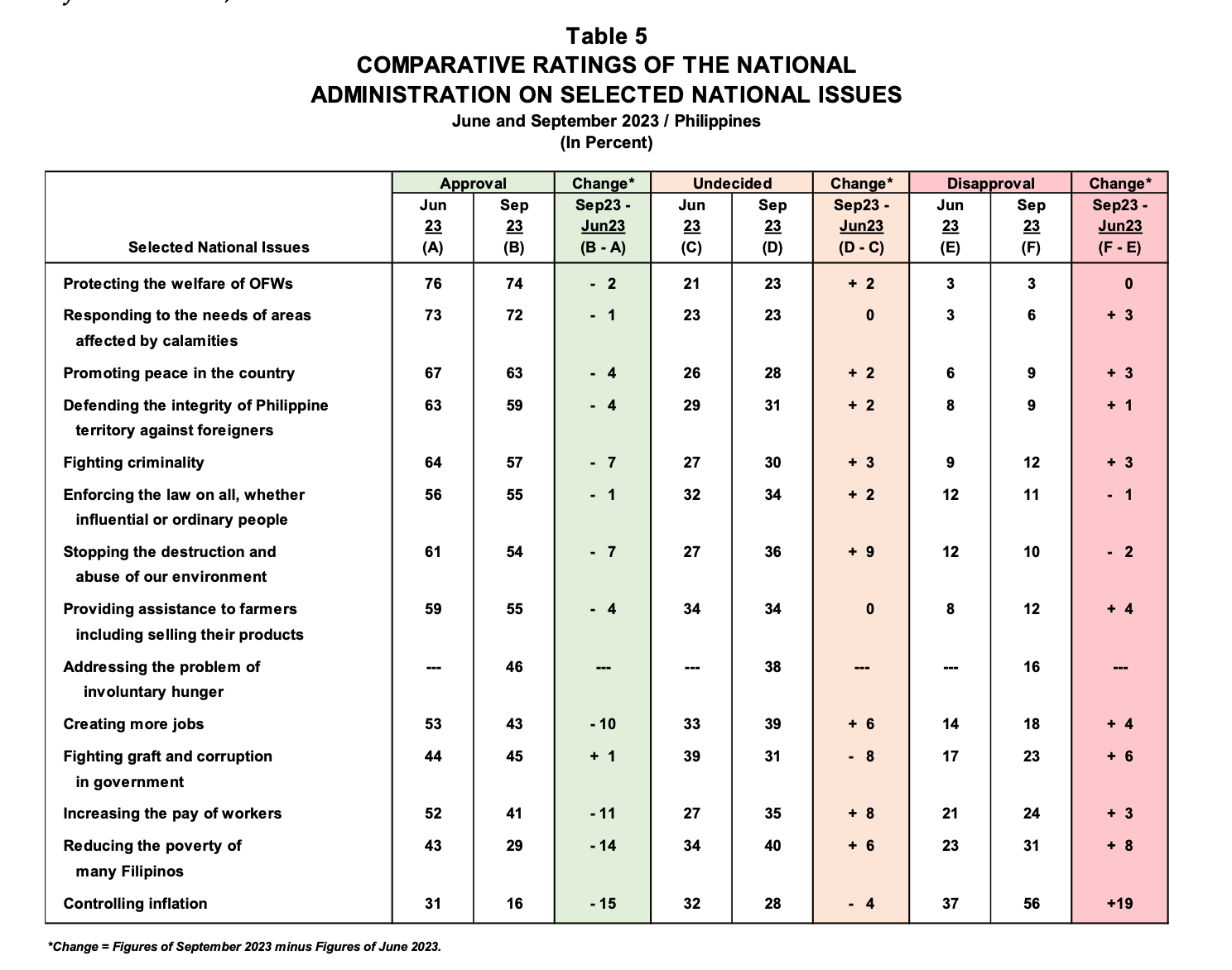SUMMARY
This is AI generated summarization, which may have errors. For context, always refer to the full article.

MANILA, Philippines – More Filipinos disapprove of how the Marcos government is reining in inflation, according to a survey conducted by Pulse Asia Research, Incorporated in September, or around the same time that government price caps on rice took effect.
Based of the results of the Pulse Asia survey held from September 10 to 14, 56% of Filipinos disapprove and 16% approve of the government’s efforts to control inflation, while 28% are undecided.
This is a substantial difference from the results of the last survey held in June, when 31% disapproved and 37% approved of government response to inflation – disapproval went up by 19 percentage points while public approval plunged by 15 percentage points in September.
This survey was conducted shortly after President Ferdinand Marcos Jr., who also serves as the agriculture chief, imposed price caps on rice – a policy that reaped criticism from economists and sectoral groups, and even surprised Marcos’ economic team.
The latest Pulse Asia survey asked 1,200 adults across the country which national issues mattered to them the most and to rate the government’s response to each issue. It has a margin of error of ± 2.8% at the 95% confidence level.
The Marcos government obtained the lowest public approval ratings in its response to gut issues: poverty reduction (29% in September from 43% in June), increasing workers’ pay (41% from 52%), and fight against corruption (45%), creating more jobs (43% from 53%), and addressing involuntary hunger (46%).
“Disapproval for the administration’s performance becomes more notable in relation to its handling of three (3) issues – fighting corruption (+6 percentage points), reducing poverty (+8 percentage points), and controlling inflation (+19 percentage points),” Pulse Asia said.

The government scored the highest in OFW protection (74%) followed by calamity response (72%).
While the administration scored majority approval ratings on eight of 14 issues, public approval of the government’s performance on selected national issues all dipped, with the exception of fighting graft and corruption which increased by 1 percentage point.
Inflation as top concern
The survey also showed that 74% of respondents highlighted inflation as the most urgent national concern. This figure is higher than the 63% who identified “controlling inflation” as the top concern in the survey held last June.
Inflation concerns cut across all socio-economic classes.
In August, the inflation rate spiked to 5.3%, primarily due to rising rice and fuel prices, the Philippine Statistics Authority reported.
Apart from inflation, Filipinos have identified several other pressing concerns, including the need to increase workers’ pay (49%), create more jobs (27%), reduce poverty levels (25%), and combat graft and corruption (22%).
In September, the approval rating of Marcos and Vice President Sara Duterte, likewise, went down by double digits.
Marcos’ approval rating, which was at 80% in June, declined by 15 percentage points, leading to a September rating of 65%.
Meanwhile, Duterte’s approval rating in September dropped to 73%, marking an 11-percentage point decrease from her 84% rating in June. – Rappler.com
Add a comment
How does this make you feel?
![[In This Economy] Marcos Year 2: Missed targets, missing reforms](https://www.rappler.com/tachyon/2024/07/TL-Marcos-Year-2-missed-targets-missing-reforms-July-5-2024.jpg?resize=257%2C257&crop=134px%2C0px%2C720px%2C720px)


![[Vantage Point] BBM Year 2: Hits and misses](https://www.rappler.com/tachyon/2024/06/thought-leaders-marcos-hits-and-misses.jpg?resize=257%2C257&crop=277px%2C0px%2C720px%2C720px)

There are no comments yet. Add your comment to start the conversation.